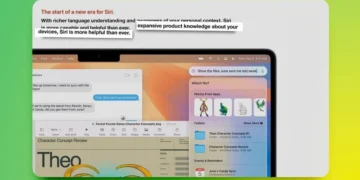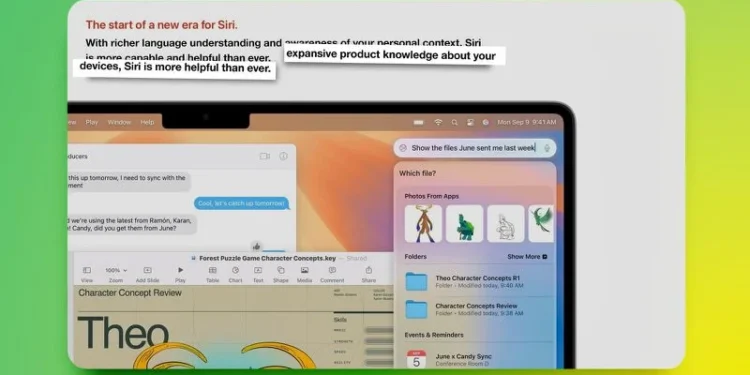Following the announcement that certain Apple Intelligence-powered Siri features promised for iOS 18 will be delayed, Apple has updated its iOS 18, iPadOS 18, and macOS Sequoia webpages, removing references to the postponed Siri capabilities.
Apple has updated its description of Siri’s capabilities, revising a section titled “The start of a new era for Siri” to reflect features that are currently available. Previously, Apple highlighted Siri’s ability to understand personal context, a feature that has yet to be introduced. The updated wording now emphasizes expanded product knowledge, a capability that was rolled out with iOS 18.2.
The original description stated: “With richer language understanding and awareness of your personal context, Siri is more capable and helpful than ever.” It has now been changed to: “With richer language understanding and expansive product knowledge about your devices, Siri is more helpful than ever.”
Apple has been promoting unavailable Siri features since last June, both on its website and in advertisements. However, with ongoing delays, the company is now adjusting its messaging to prevent misleading customers. While Apple Intelligence was a major selling point of the iPhone 16 lineup, none of its promised Siri features were available at launch. Some AI-driven functionalities arrived in iOS 18.1, iOS 18.2, and iOS 18.3, but the much-anticipated Siri enhancements remain absent.

Apple initially tied its new Siri features to the upcoming iPhone 16 models, but disappointment grew when it became evident that the enhanced Siri would not be available anytime soon. Earlier this week, Apple removed an iPhone 16 advertisement showcasing a “more personal Siri,” and now, updates to the company’s website reflect the delayed rollout.
Last week, Apple acknowledged that delivering a more personalized Siri with advanced capabilities across apps is taking longer than expected. The company now anticipates launching these features gradually over the next year.
Apple originally intended to introduce Siri enhancements, including personalized context, onscreen awareness, and deeper app integration, with iOS 18.4. However, when the first iOS 18.4 beta versions were released without any Siri upgrades, it became clear the update wasn’t ready. Some speculated that iOS 18.5 might bring these new functionalities, but recent developments suggest the smarter, more advanced Siri won’t debut until iOS 19.

Microsoft is phasing out Remote Desktop and introducing its new Windows app as a replacement. Apple
Microsoft will officially end support for its Remote Desktop app for Windows on May 27, 2025. Users who rely on the app to connect to Windows 365, Azure Virtual Desktop, or Microsoft Dev Box must transition to the new Windows app instead.
Launched in September, the Windows app offers improved features, including multimonitor support, dynamic display resolutions, and seamless access to cloud PCs and virtual desktops. After May 27, 2025, connections to Windows 365, Azure Virtual Desktop, and Microsoft Dev Box through the Remote Desktop app from the Microsoft Store will be blocked.
Microsoft’s existing Remote Desktop app should not be confused with the Remote Desktop Connection app, which has been a built-in feature of Windows for over 20 years. The latter will remain available in Windows 11 beyond May 27th, allowing users to connect to machines as long as the Remote Desktop Protocol (RDP) is supported within the Windows app.
Microsoft’s mention of RDP support suggests that personal account compatibility may eventually be introduced in the Windows app. Currently, access is limited to users with work or school Microsoft accounts, despite the company’s broader vision of transitioning Windows to the cloud. This shift aims to enhance AI-powered services and enable seamless digital experiences across devices.

Microsoft has announced that support for the Remote Desktop app, available through the Microsoft Store, will end on May 27. It will be replaced by the new Windows App, which is set to become the primary solution for remote connections.
After May 27, connections to Windows 365, Azure Virtual Desktop, and Microsoft Dev Box via the Remote Desktop app from the Microsoft Store will no longer be supported. Microsoft advises users to transition to the Windows App and review any existing feature gaps or limitations that may affect migration by consulting the “Known Issues and Limitations of Windows App” documentation.
Read Also….. Morena Shocking Incident | 2 Daughters Assault Father With Stick, He Dies by Suicide Days Later | Madhya Pradesh News















 Categories
Categories










